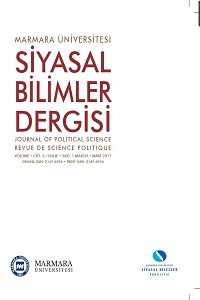Yeni Anayasa Tartışmaları Etrafında Kurucu İktidar, Kurucu Meclis ve Referandum Kavramlarının Analizi
Öz
Kıta Avrupası ve Anglo-sakson ülkelerinde çıkıp olgunlaşan “kurucu iktidar”, “kurucu meclis” ve “referandum” tartışmaları, salt ve sınırlayıcı hukuk anlayışının ötesinde siyaset teorisi etrafında şekillenmiştir. Halkın kendi kendini yönetmesi olan demokrasi, kurucu iktidarı, yani egemenliği halka ait görmektedir. Fakat genel görüşün aksine Türkiye’deki tartışmalar, anayasa hukukunun siyasal yönünün göz ardı edildiği ve bu yüzden vesayetçi bir yaklaşımla anti-demokratik ve statükocu yönü ağır basan bir seyir içerisine girmiştir. Kendilerini kurucu değerlerin muhafızları olarak gören vesayetçi elitlerin başını çektiği bu görüş, kimi hukukçular tarafından da desteklenmiştir. Demokratik yollarla ve halkın talepleri doğrultusunda yeni bir anayasa oluşturmak da dâhil, tüm anayasal düzenlemeler bu elitler tarafından gayrimeşru gösterilmeye çalışılmaktadır. Ancak başta referandum ve diğer demokratik kanallarla soyut bir kavram olan kurucu iktidar olgusunun, halkın temsilcileriyle somutlaşmasının demokrasinin asli unsurlarından olduğu unutulmuştur. Bu doğrultuda hem devletin hukuki statüsünü belirleyen hukuki bir belge, hem de devletin asli organlarını ve aralarındaki ilişkiyi belirleyen kurucu bir siyaset belgesi niteliğinde olan anayasanın, sadece olağanüstü ve hukuk-dışı ortamların bir ürünü olmadığı, demokratik ve barışçıl yollarla da yeni bir anayasa oluşturulabileceği, hatta bu yöntemin demokratik olması açısından diğerine göre daha meşru olduğu sonucuna ulaşılmıştır.
Anahtar Kelimeler
An Analysis of Constituent Power, Constituent Assembly and Referendum Concepts around the New Constitution Discussions
Öz
Debates about “constituent power”, “constituent assembly” and “referendum”, which have emerged and developed in continental Europe and Anglo-Saxon countries, revolves around political theory beyond pure and restrictive understanding of law. Meaning self-governance of people, democracy, regards constituent power, or sovereignty, as residing within people. Contrary to general understanding, however, discussions in Turkey ignore the political aspect of constitutional law, thus turn into a tutelage approach underlined by anti-democratic and status quo favoring features. Even some jurists supported this view which is held by self-appointed guardians of founding principles and tutelage favoring elites. These elites try to present all constitutional arrangements as illegitimate including creation of a new constitution via democratic means in accordance with demands of the people. Nevertheless, it is forgotten that through referendum, particularly, and other democratic channels, the solidification of phenomenon of power, which is an abstract term, with representatives of people is one of the fundamental components of democracy. In this respect, it is concluded that as a legal document designating state’s legal status and a founding political document designating essential organs of state and the relations between them, constitution is not only a product of extraordinary and extrajudicial settings, a new constitution can be created via democratic and peaceful means too and this way is more legitimate than the former in terms of being democratic.
Anahtar Kelimeler
Constituent Power Constituent Assembly Constitution Referendum Democracy
Ayrıntılar
| Konular | Siyaset Bilimi |
|---|---|
| Bölüm | Makaleler |
| Yazarlar | |
| Yayımlanma Tarihi | 15 Mart 2017 |
| Yayımlandığı Sayı | Yıl 2017 Cilt: 5 Sayı: 1 |
Kaynak Göster
Cited By
Türkiye's Referendum Experience
Uluslararası Yönetim Akademisi Dergisi
https://doi.org/10.33712/mana.1231501
“Türkiye’yi Mevcut Anayasa Kamburundan Kurtarmak”: Cumhurbaşkanı Erdoğan’ın “Yeni Anayasa İhtiyacı” Söylemine Ulusal Basının Bakışı
İnsan ve Toplum Bilimleri Araştırmaları Dergisi
https://doi.org/10.15869/itobiad.1517587
Siyasal Bilimler Dergisi, Marmara Üniversitesi Siyasal Bilgiler Fakültesi’nin hakemli akademik yayınıdır. Altı ayda bir yayınlanır. Dergide yayınlanan makalelerdeki görüşler yazarlarına aittir. Yayın Kurulu tarafından benimsendiği anlamına gelmez. Yayın Kurulu, yazının özüne dokunmaksızın gerekli yazım ve cümle değişikliklerini yapma hakkını saklı tutar. Siyasal Bilimler Dergisi, ulusal (TÜBİTAK ULAKBİM Sosyal ve Beşerî Bilimler Veri Tabanı) ve uluslararası (EBSCO, ULRICH) alan endekslerinde taranmaktadır.
Journal of Political Science is a peer-reviewed academic journal of Marmara University Faculty of Political Science. The journal is a biannual publication. All the views and opinions expressed in the articles are those of the authors and they do not necessarily reflect the views or opinions of the editor, the editorial board, or the publisher. The editorial board reserves the right to make necessary changes in spelling and sentences without changing content. The journal is indexed by EBSCO International Index, ULRICH's and the ULAKBİM Social and Human Sciences Database.

